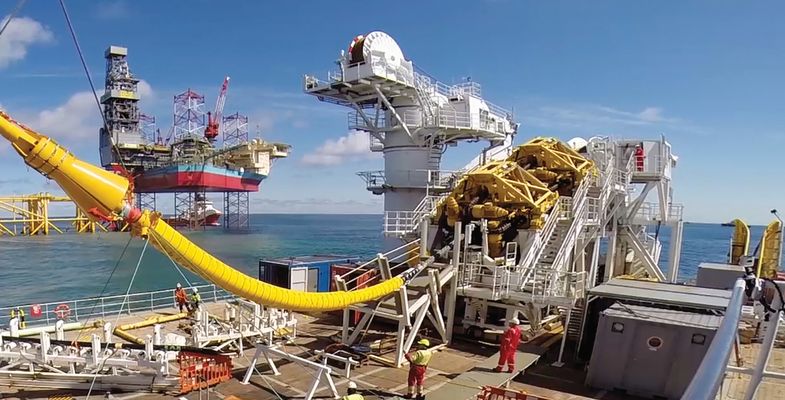ISO 19902 Fixed Offshore Structure Safety Testing
The ISO 19902 standard provides a framework for ensuring the safety and structural integrity of fixed offshore structures. This is critical in the energy sector, especially with increasing reliance on renewable energy sources like wind farms and oil and gas extraction platforms. The test addresses the dynamic forces that these structures encounter in harsh marine environments, ensuring they are safe and reliable over their operational lifetimes.
The standard focuses on structural safety by evaluating load-bearing capabilities under various environmental conditions such as wave action, water depth, and seabed characteristics. It ensures compliance with international standards, which is essential for regulatory approval and market access. Compliance with ISO 19902 helps reduce the risk of catastrophic failure, ensuring the protection of personnel, equipment, and marine ecosystems.
The testing process involves a series of detailed inspections and evaluations to assess the structural integrity under static and dynamic loading conditions. The methodology ensures that structures meet the stringent requirements set forth by ISO 19902, which are designed to minimize potential hazards in offshore environments. This service is crucial for any company involved in the design, construction, or maintenance of fixed offshore platforms.
Our approach involves a comprehensive evaluation process that includes:
- Structural inspection and analysis
- Loading tests under simulated environmental conditions
- Durability testing for long-term reliability
- Material property assessments
- Evaluation of corrosion resistance in marine environments
- Data collection and reporting to meet ISO 19902 standards
The results of this testing are vital for ensuring that offshore structures can withstand the extreme conditions they face. By adhering to these rigorous tests, we help our clients achieve compliance with international safety regulations, reducing the risk of accidents and downtime.
| Test Parameters | Description |
|---|---|
| Wave Loading | Simulation of wave forces acting on the structure. |
| Tidal Currents | Evaluation under tidal current loading conditions. |
| Seabed Interaction | Assessment of seabed interactions and soil-structure interaction. |
| Wind Loading | Evaluation under wind loading conditions. |
The process begins with a thorough inspection of the structure to identify potential weaknesses or areas requiring reinforcement. Following this, we conduct detailed load-bearing tests and durability evaluations. These tests simulate the real-world conditions that the structure will encounter during its operational life, ensuring it can withstand these forces safely.
Once testing is complete, our team provides a comprehensive report detailing all findings and recommendations for improvement or compliance adjustments. This report ensures full transparency with regulatory bodies and stakeholders, supporting decision-making processes related to safety and performance enhancements.
Scope and Methodology
The scope of the ISO 19902 Fixed Offshore Structure Safety Testing service encompasses a detailed evaluation of fixed offshore structures for their structural integrity. This includes testing under various environmental conditions such as wave action, tidal currents, seabed interactions, and wind loading.
| Test Conditions | Testing Methodology |
|---|---|
| Wave Loading | Load testing simulating wave forces. |
| Tidal Currents | Evaluating under tidal current loading conditions. |
| Seabed Interaction | Assessment of seabed interactions and soil-structure interaction. |
| Wind Loading | Evaluation under wind loading conditions. |
The methodology involves a series of tests to ensure the structure's ability to withstand these environmental forces. We use advanced instrumentation and simulation techniques to provide accurate and reliable results. Our testing process is designed to meet the stringent requirements set forth by ISO 19902, ensuring compliance with international safety regulations.
Why Choose This Test
The ISO 19902 Fixed Offshore Structure Safety Testing service offers several key advantages for companies involved in the design and maintenance of offshore platforms. By adhering to this standard, clients ensure that their structures are safe and reliable, reducing the risk of accidents and downtime.
- Compliance with International Standards: Adherence to ISO 19902 ensures compliance with international safety regulations, facilitating easier market access and regulatory approval.
- Risk Reduction: By evaluating the structural integrity under various environmental conditions, we help reduce the risk of catastrophic failure in offshore structures.
- Enhanced Safety: Our testing process ensures that structures meet stringent safety requirements, providing a safer environment for personnel and equipment.
- Improved Reliability: Durability testing under simulated environmental conditions helps ensure long-term reliability of the structure.
- Data-Driven Decision-Making: The comprehensive report provides detailed findings and recommendations, supporting informed decisions related to safety and performance enhancements.
The ISO 19902 Fixed Offshore Structure Safety Testing service is essential for any company involved in the design, construction, or maintenance of fixed offshore platforms. By ensuring compliance with this standard, clients can achieve a safer operational environment while reducing risks associated with offshore structures.
Quality and Reliability Assurance
We take great care to ensure that our testing processes meet the highest standards of quality and reliability. Our approach includes multiple layers of review and verification throughout the testing process, ensuring accurate and reliable results. We use advanced instrumentation and simulation techniques to provide precise data.
- Instrumentation: Utilizing state-of-the-art sensors and monitoring equipment for real-time data collection.
- Data Analysis: Comprehensive analysis of collected data to ensure accurate results.
- Verification: Multiple layers of review and verification by our experienced technical staff.
- Reporting: Providing detailed reports that meet the requirements set forth by ISO 19902.
The quality and reliability assurance process ensures that all tests are conducted with precision, accuracy, and repeatability. This approach not only meets but exceeds the expectations of our clients, ensuring they receive the best possible service in the field of offshore structure safety testing.





